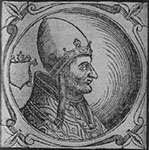Adrian IV.
|
 |
born 1100?, Abbot's Langley, near St. Albans, Hertfordshire, England
died Sept. 1, 1159, Anagni, near Rome [Italy]
original name Nicholas Breakspear
the only Englishman to occupy the papal throne (1154–59).
He became a canon regular of St. Ruf near Avignon, Fr., and in about 1150 Pope Eugenious III. (d. 1153) appointed him cardinal bishop of Albano, Italy. Eugenius sent him in 1152 as legate to Scandinavia, where his mission to reorganize the hierarchy was so successful that on his return in 1154 he was elected pope (December 4). Adrian crowned Friedrich I. Barbarossa (1123-1190) as Holy Roman Emperor in 1155, after Friedrich had captured and handed over to him Arnold of Brescia, who had led a revolt in Rome.
The papal policy toward the Normans of southern Italy, however, aroused the emperor's anger. Thereafter, the relations between Adrian and Friedrich laid the groundwork for the struggle to come between Pope Alexander II. (d. 1075) and Friedrich. Adrian refused to recognize William I the Bad, who had been crowned king of Sicily (1154). That step caused the Sicilians, after unsuccessfully attacking the papal possession of Benevento, to wage war in the southern Campania. Thereupon the pope excommunicated William.
Adrian then marched to Benevento, during which time he received John of Salisbury, secretary to the archbishop of Canterbury, and granted him the Donation of Ireland (known as the bull Laudabiliter), which supposedly gave Ireland to Henry II. (1133-1189) of England. Attacked for false representation, the bull was subsequently refuted. (Even if Laudabiliter is authentic, which is doubtful, it does not grant hereditary possession of Ireland to the English king.)
Meanwhile, in June 1156, peace was made with the Sicilians, and Adrian agreed to invest William, who in turn became the pope's liege man, which further embittered Friedrich.
Copyright © 1994-2002 Encyclopædia Britannica, Inc.
![]()
Sources
- Encylopedia Britannica 2002, Expanded Edition DVD
Web





